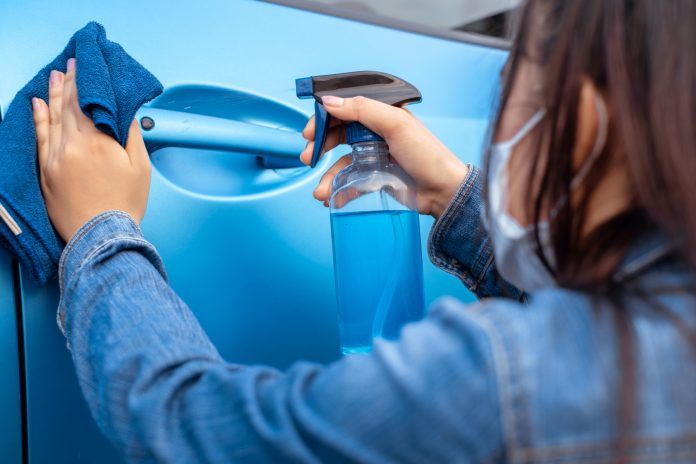Lookers Motor Group share their top 4 tips, from cleaning to fluid levels, when it comes to car care during the UK COVID-19 lockdown
Since the implementation of lockdown was confirmed on 23rd March, the reality for many in the country was one of considerably more free time. For the car enthusiasts among us, it was clear that the time spent driving our diesel, petrol, or hybrid companions was going to be no more — for the time being anyway until normality resumes.
No more leisurely Sunday drives for the free-and-easy driver and no more high-octane track days for the adrenaline junkies. Our vehicles will remain parked up for the next few months.
This period of inactivity on the roads, however, doesn’t mean that we have to completely disconnect from our vehicles. Quite the contrary, in fact. Now you have an extensive period of time where you can devote tender loving care to your vehicle, so when your return to the road does happen, it will be in the best condition it has ever been.
Similarly, if you’re still using your vehicle over the course of the coming months for work or essential travel, then you’ll need to ensure your car remains healthy and keeps you safe too. In this article, we take a look at the top four things you can do to your car over the course of lockdown.
Top-ups
When was the last time you checked your car’s fluid levels? Your screenwash is something you no doubt attend to regularly, but what about the more crucial fluids?
Engine oil, engine coolant, and brake fluid will all need to be checked and filled to their recommended level following the guidance in the owner’s manual.
Similarly, your tyres can be a cause for concern during the lockdown, with many people worrying that they will deflate if the vehicle remains stationary for a long time. Check their tread depth and for any visible defections such as tears or bulges in the sidewall. If tread depth is below 1.6mm, the tyre will need to be replaced. You can check this with a tyre tread depth gauge or by using a 20 pence piece into one of the tyre’s grooves. If the exterior band of the coin isn’t hidden by the tyre, your treads too low.
Spring clean
All those water bottles, plastic bags, and sweetie wrappers — it is time for them to go. Not only do they leave your car looking like it belongs in Scrapheap Challenge, it drastically increases your fuel consumption.
Bring everything out, bin the rubbish, and question the rest — do you really need two pairs of shoes in your boot?
In the event of a breakdown, services across the UK are continually reminding us to have an ‘emergency kit’ packed. Take the time to build this together, including a warm coat and some snacks.
Disinfectant
It’s the word on everyone’s lip and for good reason. If you are still using your car, for work, or travelling to the shops, ensuring it is not harbouring germs is crucial.
Government advice recommends that when cleaning your car, to combat COVID-19, it is essential to think of all the points which regularly come into contact with germs. We all know not to touch our face after we’ve been outside before washing our hands but, did you know, coronavirus can remain on car surfaces for up to 72 hours?
We advise leaving it for at least 72 hours after your last journey before cleaning. Don PPE (personal protective equipment) such as disposable gloves and a disposable apron. Door handles, stereo controls, air conditioning buttons, the steering wheel, headrests, and windows are all definite focus points but, in reality, the car requires a proper Kim and Aggie style disinfecting — otherwise you could be placing yourself, and others, at risk.
Alloy attention
There is no denying that a set of alloy wheels will do a lot for a car’s aesthetic appeal. The regular blast with a power hose never does quite enough to restore these magnificent components to their absolute best. However, with time on your side, you could make shine so well, Take That would burst into song looking at them.
You’ll need a bottle of alloy wheel cleaner and a bottle of alloy wheel sealant — make sure to pick up alloy specific options. Start by rinsing the wheels with a hose to remove and loose dirt and debris. Ensure that all of the alloy has been soaked, not leaving bits untouched. The areas you can’t see are probably the areas which are dirtiest.
Apply a generous amount of the cleaner across the entire surface of the alloy and allow the cleaner to soak in for a few minutes, following the instructions on the bottle. Scrub the wheel with a soft-fibre brush, removing all off the compounded dirt, before rinsing and drying with a microfibre cloth.
Finally, in order to protect the alloy from further build-up of hard dirt and debris, apply the sealant. This will serve as a protective coating against the likes of grease and tar.
If you are a key worker and require essential maintenance work to your vehicle over the coming months, Lookers are keeping garages across key locations open, providing repairs free of labour charges.











